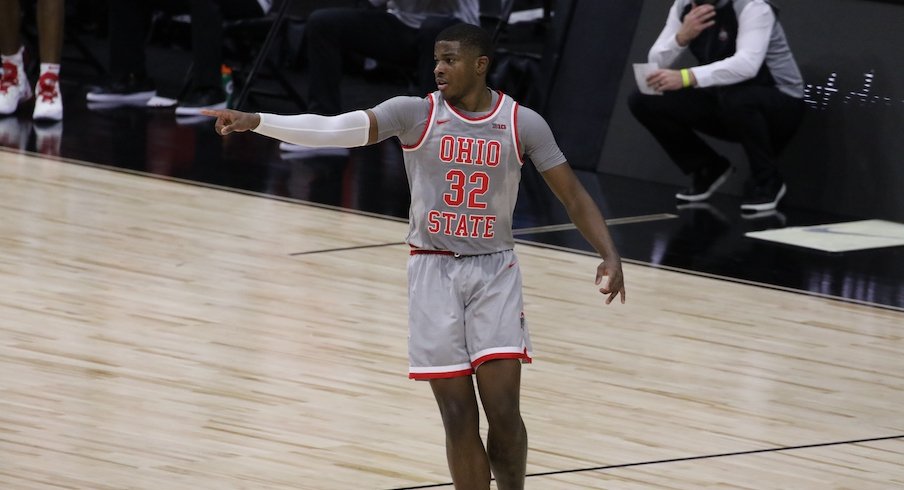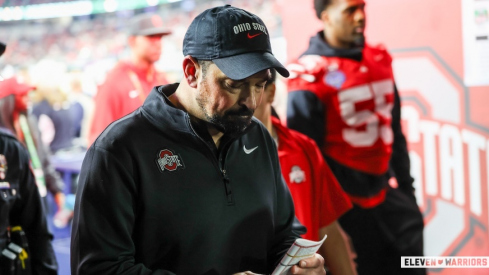E.J. Liddell hadn’t even gotten to Ohio State the first time he experienced vitriol through virtual means. Years ago, as a senior at Belleville West High School in Illinois, he received text messages from students at rival schools whose teams he went up against on the court. To this day, he remembers them.
You suck.
You’re a terrible person.
Back then, he didn’t make them public. He moved on with his life, keeping them in his mind yet not rolling down the window to offer a glimpse to outsiders at what he goes through.
“I just shook them off, really, because I don't want to be looked at as soft,” Liddell said on Wednesday. “I just had tough skin for a while when it came to things like that.”
The messages Liddell received after the Buckeyes’ season-ending loss to Oral Roberts, he decided, necessitated a different response.
The sophomore forward, who recorded 23 points, 14 rebounds and five assists against Oral Roberts, avoided looking at his phone in the immediate aftermath of Friday’s defeat. The result devastated him, and he doesn’t like checking his phone right away in the locker room anyway. On the one-hour bus ride from West Lafayette to Ohio State’s team hotel Indianapolis, he closed his eyes, put his AirPods in and listened to music. Not until they were on their way back to Columbus that night did he look at his messages.
There, he found what he described as “hurtful things people said about me.” One person called him a “piece of shit,” another called him a “pussy ass bitch.” Both said they wanted him to die.
“It definitely bothered me a little bit just because I go out there with a smile on my face every game just ready to play basketball,” Liddell said. “Just for people to feel so ill about me having a couple turnovers or missing a one-and-one free throw just doesn't sit right with me because I have feelings, too.”
Honestly, what did I do to deserve this? Im human. pic.twitter.com/djXzhSH0q8
— E.J. Liddell (@EasyE2432) March 20, 2021
Liddell says it wasn’t the first time he has had such heinous messages – even with that degree of hatred – directed toward him.
But these still stuck out to him in the moment. So he went to social media with them and tweeted screenshots of what they said.
“I knew some other people was going through it, especially my teammates, because I know a couple people it hasn't always been their night. It hasn't always been my night,” Liddell said. “I just wanted to use my voice a little bit. I've been kind of quiet about it. I just keep pushing because I have pretty tough skin when it comes to criticism. But that wasn't constructive criticism. It was just brutal and hardcore. It just didn't sit right with me.”
As of noon on Wednesday, Liddell’s tweet – in which the caption reads, “Honestly, what did I do to deserve this? I’m human.” – has 17,200 retweets, 12,000 quote tweets and 223,600 likes. He appeared on CNN to talk about the experience and what he wants people to know about it. Numerous other basketball players from the Big Ten, including Purdue’s Trevion Williams, Wisconsin’s D’Mitrik Trice and Michigan State’s Rocket Watts and Malik Hall, shared with him that they had been going through similar experiences. Professional athletes from other sports stood up on his behalf.
Liddell, who says he now feels “fine” five days later, didn’t expect such a widespread response to his tweet.
“I feel like it had to be said by someone, honestly, and I'm happy I can be, I guess, the so-called spokesperson for this,” Liddell said. “Because I've received messages like this for a while and I just feel as if it was time to say something honestly.”
Ohio State helped Liddell file a police report regarding the messages. Speaking on the Torg and Elliott Show on Wednesday morning, head coach Chris Holtmann said authorities have “zeroed in on one of the guys for sure.” He thinks “there's going to potentially be some resolution to it.” Holtmann also said Liddell would have to decide whether he wants to follow through with prosecution. Liddell, when asked about that, said he has “been trying not to think about it.”
For now, Liddell is trying to raise awareness about what athletes hear on social media and get back to his normal life.
“A lot of athletes are supposed to be looked at as just entertainers, really, and we're supposed to be tough always and show people that things don't get to us,” Liddell said. “But sometimes it really does. I know some athletes take it different than me. I just look at it as my family, I have a little brother, a little sister, a mom, dad, big sister, and a whole bunch of other family that supports me. I definitely wouldn't want them to be talked about like that or talked to like that. And I don't want anybody in my family to talk to people like that. I just want to be treated how a person wants to be treated.”
And nobody should receive the messages he got. Not Liddell, not any other athlete.
If Liddell could ask the offenders one question, it would be simple.
“I would ask them why he felt like it was OK to say something to another human like that,” Liddell said. “Just not even me, just the fact that you think so bad about a person and feel so bad about a person that you could say things like that.”
Maybe some people think they know the answer to that. Liddell isn’t one of them.
One of the main reasons why? He couldn’t imagine sending those messages to somebody.
“I feel like everybody's known me for my two years and they know I'm not a mean person,” Liddell said. “I walk out my room everyday and just embracing life and living every day, day by day with a smile on my face.”


